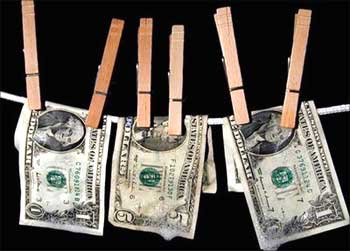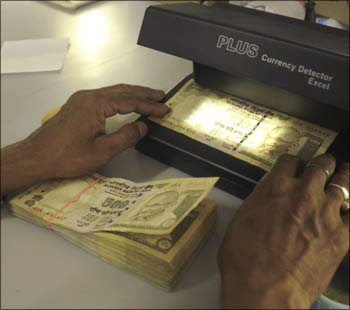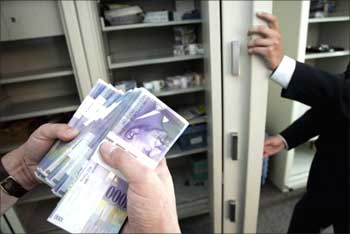
A few weeks before the Commonwealth 'Gains' scandal erupted a friend forwarded me an email with the following headline: 'Our Indians' money: 70,00,000 crore rupees (Rs 70 trillion) in Swiss Bank'.
The accompanying message claimed that no other country has such a large amount of black money lying in Swiss banks.
Even more startlingly, it added, the Swiss government is willing to divulge details of the depositors if the Indian government would only just ask for this information.
As an anonymous, no-source message it had the distinct whiff of a hoax. Plus, the closing line was a clear give away. It asked the reader to circulate the note to at least ten people 'as a service to our motherland and your contribution to this struggle'.
Who would initiate such a hoax, and why, is for cyber sleuths to find out.
What matters is that enough people are deeply disturbed by mega-scale corruption and undeclared wealth lying outside the country. That's why they fall prey to such a hoax and actually forward it.
. . .

How can we be sure that it's a hoax?
It is estimated that the total amount of undeclared wealth in Swiss accounts is about $2 trillion (about Rs 92,76,000 crore!). Since large amounts of undeclared wealth are generated across the world it is highly unlikely that three-fourth of the black money in Swiss banks could have been deposited by Indians alone.
Above all, the claim that Swiss banks are willing to hand over information about their depositors is a total give-away. Doing this would bring down the Swiss banking system.
Nevertheless, the amount of money siphoned out of India is staggering. According to the Washington-based NGO, Global Financial Integrity, about $23-$27 billion of black money left India every year in the period 2002-06.
That is why India last month signed a pact with Switzerland amending the existing double taxation avoidance agreement -- in the hope that it will now be easier to access information on suspect bank accounts.
This won't stop most of us from feeling resigned about such money flight -- dejectedly relegating the phenomenon to the 'unsolvable' category of problems.
. . .

But the United Kingdom-based Tax Justice Network defies this pessimism by promoting transparency in international finance and lobbying against various kinds of secrecy [https://www.taxjustice.net/cms/front_content.php?idcatart=2].
It fights against all forms of tax evasion, tax avoidance, and other mechanisms that enable owners and controllers of wealth to escape responsibility to the societies on which they and their wealth depend.
This network is mobilised by a fundamental truth: 'Tax Havens Cause Poverty'. Such havens, or 'secrecy jurisdictions' as the Network calls them, are thus its primary focus of concern.
By allowing the elite to escape tax and regulation, says the Tax Justice's website, such secrecy jurisdictions heighten inequality and poverty, corrode democracy, distort markets and undermine financial and other regulation. In turn this curbs economic growth, accelerates capital flight from poor countries and promotes corruption and crime around the world.
So far Tax Justice Networks' research shows that about a third of total global capital is parked in offshore secrecy jurisdictions -- effectively beyond the reach of taxation.
Over half of all world trade passes through tax havens -- causing developing countries to lose revenues far greater than what they get annually as aid.
. . .

High net worth individuals are estimated to be holding about $11.5 trillion off shore, resulting in an approximately $250 billion loss of tax revenue annually. This is five times what the World Bank, estimated in 2002 would be the cost of implementing the UN Millenium Development Goal of halving world poverty by 2015.
So what can be done?
Tax Justice addresses this challenge by supplying expertise and analysis aimed at opening tax havens up to proper scrutiny. It also aims to increase access by making complex issues understandable by all. It seeks to mobilise policy-makers, social and commercial organisations as well as individuals in favour of regulations that would:
Eliminate cross-border tax evasion and limit the scope of tax avoidance;
Increase the influence of citizens to ensure democratic control of taxation, thus restricting the power of capital to dictate tax policy solely in its own interests. Over the last few decades taxes paid by large corporations have fallen. Tax Justice Network works to reverse the shifting of tax burden onto ordinary citizens.
Foster stronger tax cooperation between countries in order to strengthen national tax systems in this age of globally mobile capital.
. . .

Instead of a legalistic approach, the Network favours an accountability-driven approach, differentiating between what is responsible and what is not. A responsible approach sees tax not as a cost to a company to be avoided, but like a dividend: a distribution out of profits to all stakeholders.
Such work is premised on the fact that profits are not made merely by deploying investors' capital. Profits are possible because of complex social, physical and legal infrastructure. Thus: 'Tax is the return due on this investment by society from which companies benefit.'
It may seem that such actions don't offer a direct solution for the endemic problem of corruption -- the 'cuts' taken by bureaucrats and politicians on public projects.
But such misdemeanours are currently made easy because there are havens in which ill-gotten wealth can be secretly stashed.
If the large network of international NGOs that constitute the Tax Justice Network even partially succeed, they will make life very hard for those who now get away with stealing public funds.